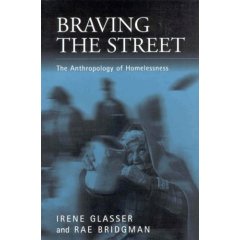home
REVIEWS
Braving
the Street: The Anthropology of Homelessness

click
to see larger image
Catherine
Kingfisher. 2001. Poverty and Downward Mobility in the Land of Opportunity.
(Review article.) American Anthropologist 103(3): 824-827.
"[Glasser
and Bridgman] present key themes from the available literature in
a way that affords policy makers and other practitioners access to
what it is that anthropology has to offer in thinking about and responding
to homelessness on a day-to-day, ground level. In this endeavor, [the
book] is supremely successful."
Gill,
Tom. 2003. Glasser, Irene & Rae Bridgman, Braving the Street:
The Anthropology of Homelessness. Journal of the Royal Anthropological
Institute 9(3): 600.
“This
slim, useful book ... is suitable for students ... The fairly tight
North American focus allows for great accuracy and detail, and the
Canadian material is especially interesting, because Canadian social
policy is less well known than that of the United States, and seems
far more progressive on homelessness.”
Drozdow-St.
Christian, Douglass. 2001. Review of Braving the Street: The Anthropology
of Homelessness (by Irene Glasser and Rae Bridgman). Anthropologica
XLIII(2).
Unlike
what we too often teach, in abstractions, in lecture halls throughout
the country, Glasser and Bridgman want it understood clearly that
homelessness is a risk each of us faces and which each of us must
take responsibility for. This book, brief as it is, makes clear what
our students have been telling us, increasingly I have found, as more
and more of them take up their own engagement with the politics of
our era—an anthropology which is not politically and morally
engaged in addressing the conditions of risk of inequality, and of
powerlessness, is an anthropology which contributes to and perpetuates
those conditions. This requires..."a refusal to play with the
false opportunities of capitalism, a refusal to accept it as the natural
order of things, and instead, working[ing] towards a critique that,
in its perceptions, helps formulate alternatives (Smith,Gavin. 'Confronting
the Present,' University of Toronto Press, 1999, p. 267). While Glasser
and Bridgman focus on one such set of conditions and alternatives,
their argument speaks loudly and effectively to anthropologists and
their students about the obligations each of us has to become active
agents, not only for social understanding but, most importantly, for
social change.
Metraux,
Stephen. 2001. Review of Braving the Street: The Anthropology of
Homelessness (by Irene Glasser and Rae Bridgman). Contemporary
Sociology 29: 718-719.
[The
authors emphasize] the need to place individual attributes typically
asssociated with homeless persons, such as mental illness or drug
abusein, into a broader structural context that inclues issues such
as housing, employment, and urban decline. [They] showcase ethnographic
research, showing how this research does more than just contribute
'local color' to presentations of homelessness.
Wolch,
Jennifer. 2001. Review of Braving the Street: The Anthropology of
Homelessness (by Irene Glasser and Rae Bridgman). International
Journal of Urban & Regional Research 25(2).
Braving
the Street...is a welcome and accessible addition to the literature
on contemporary homelessness. It demonstrates how useful anthropological
perspectives and methods can be in the area of urban homelessness,
and articulates some of the most intriguing and vital questions that
remain open and need attention from researchers.
See also:
Braving
Homelessness on the Ethnographic Street with Irene Glasser and Rae
Bridgman, by Mary Madden. Critique of Anthropology, Vol. 23,
No. 3, 289-304 (2003) and R. Bridgman and I. Glasser; and Bridgman and
Glasser's response—Book Review: Response to Mary Madden's review
article, 'Braving Homelessness on the Ethnographic Street with Irene
Glasser and Rae Bridgman.' Critique of Anthropology, June 1,
2005; 25(2): 207 - 208. (Available through Sage
Journals Online.)
and
|
